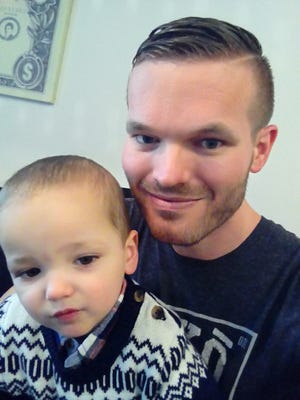Millions of exiles are caught in Brexit web

LONDON — Nazir Wilks has been homeless for months and must rely on the goodwill of friends and family to provide him and his 2-year-old son shelter. He blames Brexit for his misfortune.
That's because Wilks, 31, a British national, had been living in France but French employers refused to hire him, citing Britain’s impending exit from the European Union. "For French employers, it’s a risk for them to hire British people — it would be costly for them to hire us and we get deported," he said.
Wilks, who was forced to moved back to London on Christmas Eve, had been one of 1 million British nationals residing in other EU member countries. There also are 3 million EU citizens living in Britain, and their fates are intertwined.
The reason: When the British government formally exits the EU, a process that could take two years, the automatic living and working rights British nationals have in the 27 other member countries — and similar rights of European nationals living in Britain — could be eliminated.
For the time being, neither Britain nor the EU has determined what those rights will be after the country leaves the EU, but prospects for a continuation of the status quo are unclear after Parliament declined this week to guarantee existing protections for European nationals post-Brexit.
The uncertainty over what will happen is causing anxiety on both sides of the English Channel.

Wilks, who separated from his son's French mother before returning to Britain, has struggled to prove to British authorities that he intends to remain in the U.K. permanently so that he can claim government income support. "I’m in this position, I believe, directly because of Brexit," he said. "Everything was fine before the referendum" last June, when a majority of U.K. voters supported an exit from the EU.
Alicja Kaczmarek, director of the Polish Expats Association, which represents the interests of the 800,000 Poles living in the U.K. — more than any other EU member — also worries about the impact of Brexit on her.
Kaczmarek, 38, came to the U.K. in 2004 and her 4-year-old son is a British citizen, as is his father. “What residency rights will we have in future? Will I need a work permit? Will I get a work permit?,” she asked. “Staying and hoping that things will turn out good is being naïve. I have to be prepared and decide what future I can offer my son.”
READ MORE:
Britain's Brexit battle about to enter new phase
Scottish leader Nicola Sturgeon seeks new independence referendum
Upper house of Parliament deals May stinging defeat over EU citizens' rights
Trump state visit to Britain postponed, report says
Despite the uncertainty about the future status of foreign nationals, immigration from some EU countries appears to be increasing, according to Britain's Office for National Statistics. The number of Bulgarians and Romanians who emigrated to Britain to work rose by 19,000 between September 2015 and September 2016 to to 74,000. Overall, however, migration from EU countries to Britain since the June referendum is little changed.
Net migration of EU citizens to the U.K. rose from an estimated 174,000 in 2014 to 184,000 in 2015, according to The Migration Observatory at the University of Oxford.
For German national Sandra Arndt, 38, a climate scientist, the writing was on the wall even before Brexit. She left the southwestern English city of Bristol in December and moved to Brussels with her husband, who grew up in France, and their 3-year-old son.
“We were one of the first to leave,” she said.
Arndt said she and her family could feel an anti-European atmosphere building up in Britain in political campaigns for the 2015 general election. Now a professor at the Free University of Brussels, she got the job offer two weeks before a majority of Britons voted to leave the EU.
"We didn’t really feel at home anymore and we didn’t feel a future for ourselves (in Britain)," she said.